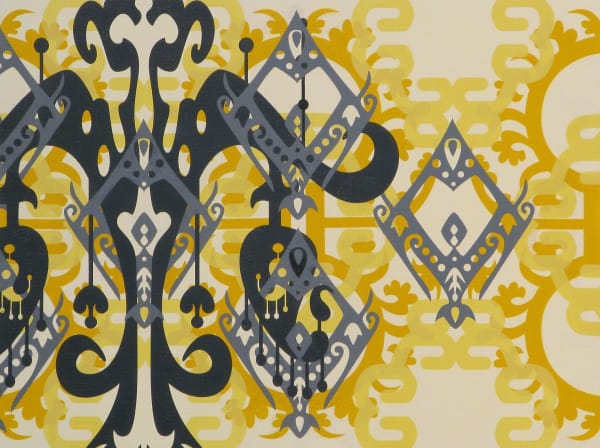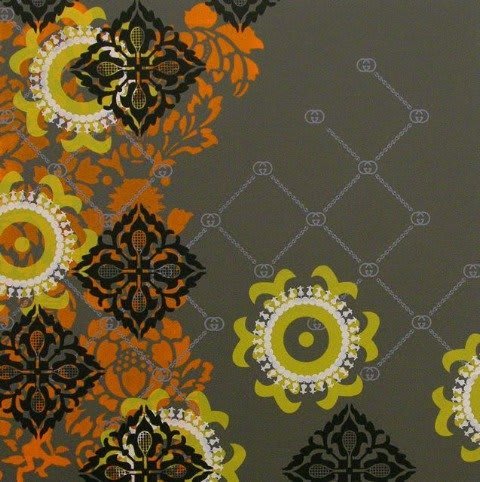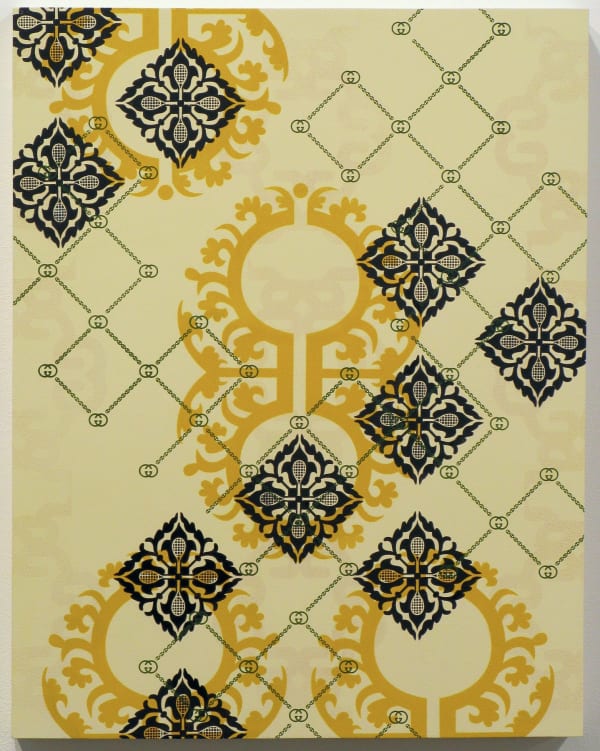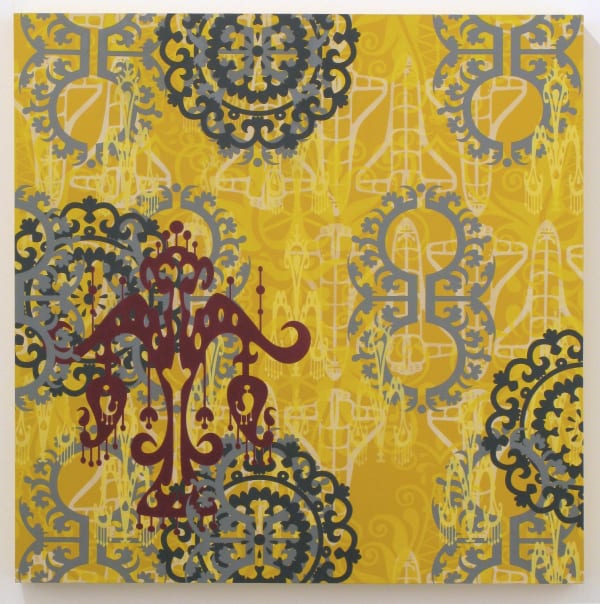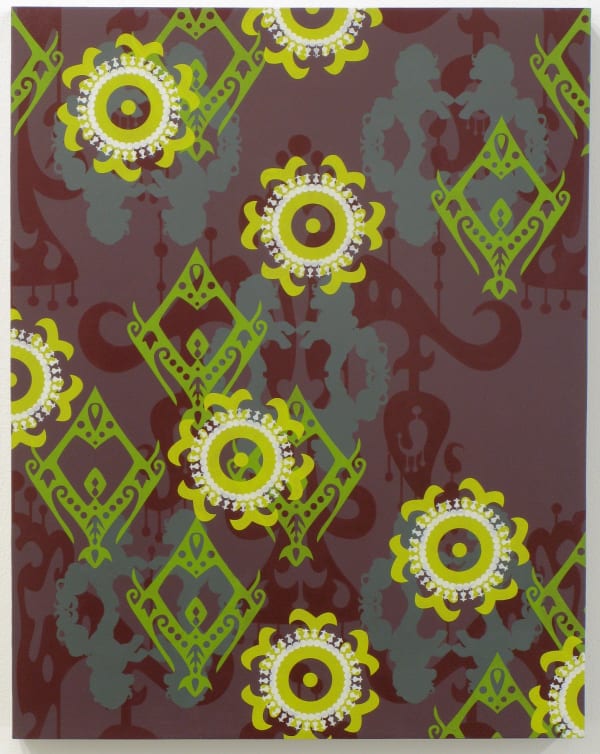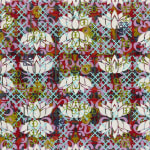Julie W. Chang: Silk Road STYLE, Orange County Chic!
Inspired by her 2010 residency at San Francisco’s de Young Museum, Julie Chang presents a series of paintings made by layering repeating patterns. With a lexicon pulled from traditional Central Asian tribal sources as well as contemporary signifiers of place, social class and personal history, she explores the West’s fixation on, and romanticism of, the Orient and her own ambivalent relationship to it.
Concurrent with Chang’s de Young residency was the exhibition “To Dye For: A World Saturated in Color” which included traditional Ikats and Suzanis from Central Asia. The motifs that decorate these wall hangings and bed covers are both emblems identifying a particular tribe and talismans important to the individual maker. Chang found commonality in the work she has been making for the last 5 years and the way Janet Harvey describes these textiles in Traditional Textiles of Central Asia:
Inherited from the practice of shamanism of the earliest inhabitants of central Asia is the belief in the life-giving or threatening forces of nature which require constant appeasement. Woven or embroidered images may communicate a belief or an aspiration, express fear or represent an offering.
Chang, who grew up in Orange County, California, couldn’t be more all-American. But her parents, who emigrated from China, have their roots in the very area where these textiles originated – the Silk Road which connected the East and West. Her parents’ pursuit of the suburban American Dream included a large ranch-style home, complete with elaborate wallpaper and fancy chandeliers. For the past five years, Chang’s work has explored her interpretation of the apparent attempt by her parents to “camouflage” their immigrant status with the trappings provided by an interior decorator. In her current work, Chang utilizes “traditional” as well as “non-indigenous” motifs (wallpaper patterns, anti-depressants, palm trees, tennis rackets, diamond engagement rings, logos from international luxury brands, and tacky Chinese-manufactured children’s toys) to explore the social and cultural significance of “East meets West” aesthetics. While borrowing emblems from a culture to which she has genetic ties, she also acknowledges that her relationship to that culture is as distant and as without personal connection as any Westerner accused of cultural colonialism.
Last year, Julie Chang won a commission to create public art for the grand concourse of the San Francisco Trans Bay Terminal. When completed in 2015, her project, a 20,000 square-foot terrazzo floor, will be the largest fine art application of that material in history.
Julie Chang was raised in Orange County, California and lives in San Francisco. She received a BA from Tufts and a BFA from the School of the Museum of Fine Arts, Boston before doing graduate studies at the San Francisco Art Institute and completing an MFA in 2007 at Stanford. This is her second solo exhibition at Hosfelt Gallery.
-
 Julie W. ChangGraphite and Gold Argyle Ikat, 2011acrylic on panel15 x 20 x 3 in
Julie W. ChangGraphite and Gold Argyle Ikat, 2011acrylic on panel15 x 20 x 3 in -
 Julie W. ChangGraphite and Gold Pistol Trellis, 2011acrylic on panel15 x 20 x 3 in
Julie W. ChangGraphite and Gold Pistol Trellis, 2011acrylic on panel15 x 20 x 3 in -
 Julie W. ChangRacquet Link Sun Discs, 2011acrylic on panel18 x 18 x 3 inches
Julie W. ChangRacquet Link Sun Discs, 2011acrylic on panel18 x 18 x 3 inches -
 Julie W. ChangRacquet Link Double Suzani, 2011acrylic on panel28 x 22 x 3 inches
Julie W. ChangRacquet Link Double Suzani, 2011acrylic on panel28 x 22 x 3 inches -
 Julie W. ChangShuttle Bling Argyle Ikat, 2011acrylic on panel23 x 95 x 3 inches
Julie W. ChangShuttle Bling Argyle Ikat, 2011acrylic on panel23 x 95 x 3 inches -
 Julie W. ChangShuttle Rig Double Suzani Ikat, 2011acrylic on panel36 x 36 x 3 inches
Julie W. ChangShuttle Rig Double Suzani Ikat, 2011acrylic on panel36 x 36 x 3 inches -
 Julie W. ChangThank You Link Double Suzani, 2011acrylic on panel17 x 11 x 3 inches/43.2 x 27.9 x 7.6 cm
Julie W. ChangThank You Link Double Suzani, 2011acrylic on panel17 x 11 x 3 inches/43.2 x 27.9 x 7.6 cm -
 Julie W. ChangPony Argyle Sun Discs, 2011acrylic on panel28 x 22 x 3 inches
Julie W. ChangPony Argyle Sun Discs, 2011acrylic on panel28 x 22 x 3 inches

